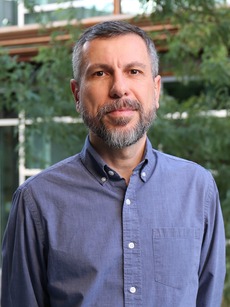[miˈk̟ɛɫ simoˈnət]
"We are all apprentices in a craft where no one ever becomes a master." The Wild Years, Ernest Hemingway.
Miquel Simonet is Professor of Spanish Language and Linguistics at the University of Arizona. Dr. Simonet is a phonetician and phonologist working within the tradition known as Laboratory Phonology. He specializes in the phonetics and phonology of Ibero-Romance. Laboratory phonologists employ the auxiliary theories and methods of instrumental phonetics and experimental psycholinguistics to investigate phonological knowledge, the mental representation of sounds and sound patterns. Dr. Simonet's research revolves around the following themes: the phonetics-phonology interface (gradient and categorical sound patterns), phonetic and phonological variation and change (in Ibero-Romance; historical phonology), and the effects of individual bilingualism and societal language contact on phonetic behavior and phonological knowledge. Dr. Simonet's publications have appeared in journals such as the Journal of Phonetics, the Journal of the International Phonetic Association, Language and Speech, Phonetica, Laboratory Phonology, Linguistics, Probus, Studies in Second Language Acquisition, Second Language Research, the International Journal of Bilingualism, Linguistic Approaches to Bilingualism, and Studies in Hispanic and Lusophone Linguistics.
Dr. Simonet has served as Associate Editor of Journal of Phonetics (2022-2025) and Applied Psycholinguistics (2018-2021). He serves on the editorial boards of Second Language Research, Applied Psycholinguistics, and Laboratory Phonology. In the Department of Spanish and Portuguese, Dr. Simonet has served as Director of Graduate Studies and as main graduate advisor for students in Hispanic Linguistics. He has chaired the Cognitive Dimensions concentration in the Second Language Acquisition and Teaching (SLAT) interdepartmental doctoral program, thus serving on the Executive Committee of SLAT (2018-2023, 2025-). Dr. Simonet is the IRB Liaison in the College of Humanities (COH). He supports colleagues in COH regarding the IRB process. Dr. Simonet is also affiliated with the Department of Linguistics, where he is a member of the graduate faculty.
Dr. Simonet has chaired or co-chaired 12 PhD dissertations (7 in Hispanic Linguistics, 5 in SLAT). He has served as member in 16 additional PhD dissertation committees at various institutions, both in the US and overseas. Dr. Simonet welcomes communications from prospective graduate students interested in conducting research in the following areas: phonetic and phonological variation and change in the Romance languages, Spanish phonetics and laboratory phonology, and bilingual and second language phonetic and phonological processing (production, perception, lexical access). He can direct doctoral dissertations in the Hispanic Linguistics PhD program (Spanish and Portuguese) and the interdepartmental SLAT PhD program.
Dr. Simonet graduated with a PhD in Romance Linguistics from the University of Illinois at Urbana-Champaign in 2008. His doctoral advisor was José I. Hualde. Arriving at the University of Arizona as an Assistant Professor in 2008, Dr. Simonet was promoted to the rank of Associate Professor with tenure (Span. profesor titular) in 2015, and to the rank of Professor (Span. catedrático) in 2023.
Now boarding:
- "Perceptual sensitivity to marginal phonemic contrasts: Discrimination and lexical processing of the Portuguese mid-front vowels." (with Jessica C. Tiegs)
In flight:
- "The Phonetics of Spanish" (under review). Cambridge Elements in Phonetics. Cambridge University Press. (with Nicholas Henriksen).
- "External vowel sandhi in Castilian Spanish: An acoustic study of vowel sequences across word junctures" (in press). Language & Speech. (with Jessica C. Tiegs)
- "Using offline methods to probe the bi/multilingual acquisition of phonological and phonetic domains" (in press). In Quantitative Research Methods in Multilingual Acquisition and Processing, ed. by G. Klassen and J. Schwieter. John Benjamins, Amsterdam, The Netherlands. (with M. Lompart)
Landed (5 most recent):
- Simonet, M., Ramírez Martínez, M., and F. Torres-Tamarit (2025) “Velar palatalization, phonologization, and sound change: An acoustic study of /k/-fronting in Majorcan Catalan.” Journal of Phonetics, 112, 101430.
- Llompart, M., and M. Simonet (2024) “El procesamiento fonológico en hablantes bilingües” (Phonological Processing in Bilinguals). In Dos lenguas, un cerebro: el procesamiento lingüístico en hablantes bilingües (Two Languages, One Brain: Language Processing in Bilinguals), ed. by E. Álvarez. Peter Lang, Berlin, Germany.
- Ramírez, M., and M. Simonet (2023) “Phonetic variants of Majorcan Catalan /ʒ/: A controlled study in societal language contact.” International Journal of Basque Linguistics and Philology, 57, 825-840.
- Ortín, R., and M. Simonet (2023) “Perceptual sensitivity to stress in native English speakers learning Spanish as a second language.” Laboratory Phonology, 14, 7978.
- Ortín, R., and M. Simonet (2022) “Phonological processing of stress by native English speakers learning Spanish as a second language.” Studies in Second Language Acquisition, 44, 460-482.


